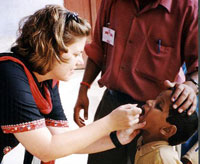The U.S. childhood immunization schedule is overwhelmingly made up of injectables. Yet in among the vaccines for measles, mumps and other diseases are two orally delivered products--GlaxoSmithKline's ($GSK) and Merck's ($MRK) rotavirus vaccines. The rarity of oral vaccines means providers have less experience delivering them, but does this mean there are more errors?
Researchers at the Centers for Disease Control and Prevention (CDC) attempt to answer this question in the latest Morbidity and Mortality Weekly Report. The good news is mistakes are very rare. CDC has 66 reports of administration errors from 2006 to 2013, which--with 55 million doses having been distributed--works out as less than 1 mistake per 833,000 vaccines. The passive surveillance system used by CDC can underestimate errors, but even so it appears mistakes are likely rare.
 |
| Courtesy of CDC, public domain |
Almost two-thirds of the reports were generated after someone injected the vaccine. This happened 39 times and caused adverse events--such as irritability--in almost 50% of cases. A single, poorly trained nurse accounted for 6 of the mistakes. Others cited a failure to read the package instructions and confusing the oral applicator syringe for an injection device as reasons for their mistakes. CDC believes healthcare providers can eliminate such errors by properly training staff.
Nurses who properly administer the vaccines not only deliver better care to patients, but also protect themselves from mishaps. The second most common incident is when the infant coughs, sneezes or spits the vaccine back into the eye of the healthcare provider. Several infants also got the vaccine in their own eyes, while one ejected the liquid at their parent. Minor eye irritation occurred in most cases but there were no serious adverse events.
In the context of the health benefits caused by widespread use of the vaccines--which CDC estimates have prevented 50,000 hospitalizations a year--the rare errors are a minor risk.
- here's the CDC report
- check out CBS News' take